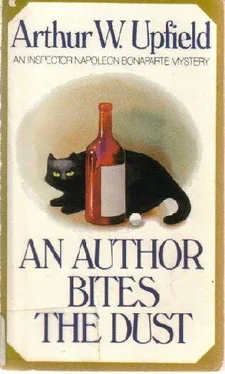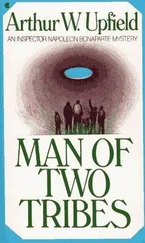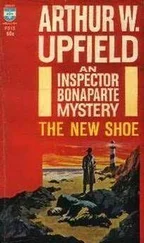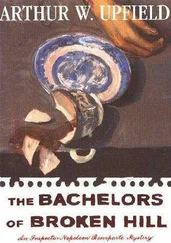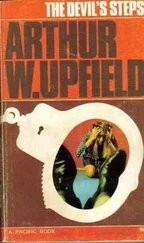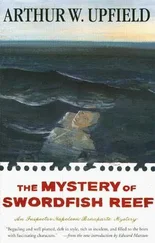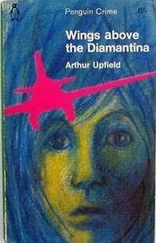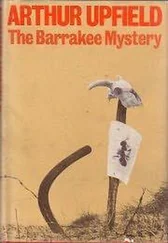Arthur Upfield - An Author Bites the Dust
Здесь есть возможность читать онлайн «Arthur Upfield - An Author Bites the Dust» весь текст электронной книги совершенно бесплатно (целиком полную версию без сокращений). В некоторых случаях можно слушать аудио, скачать через торрент в формате fb2 и присутствует краткое содержание. Жанр: Классический детектив, на английском языке. Описание произведения, (предисловие) а так же отзывы посетителей доступны на портале библиотеки ЛибКат.
- Название:An Author Bites the Dust
- Автор:
- Жанр:
- Год:неизвестен
- ISBN:нет данных
- Рейтинг книги:5 / 5. Голосов: 1
-
Избранное:Добавить в избранное
- Отзывы:
-
Ваша оценка:
- 100
- 1
- 2
- 3
- 4
- 5
An Author Bites the Dust: краткое содержание, описание и аннотация
Предлагаем к чтению аннотацию, описание, краткое содержание или предисловие (зависит от того, что написал сам автор книги «An Author Bites the Dust»). Если вы не нашли необходимую информацию о книге — напишите в комментариях, мы постараемся отыскать её.
An Author Bites the Dust — читать онлайн бесплатно полную книгу (весь текст) целиком
Ниже представлен текст книги, разбитый по страницам. Система сохранения места последней прочитанной страницы, позволяет с удобством читать онлайн бесплатно книгу «An Author Bites the Dust», без необходимости каждый раз заново искать на чём Вы остановились. Поставьте закладку, и сможете в любой момент перейти на страницу, на которой закончили чтение.
Интервал:
Закладка:
On putting down the book, Bony was inclined to agree with Bagshott that Dr Chaparral had been carefully shepherded in Australia, for the names of several Australian authors and poets that had become household words were not included in the doctor’s survey.
Bony was, indeed, finding this an absorbing investigation, andwas tasting it with the pleasure of a gourmet at a banquet. Here were eight people drawn together with one unifying interest. One of the eight could be safely eliminated-Marshall Ellis, the Englishman, who had apparently been led along the same path as Dr Chaparral. With the exception of Wilcannia-Smythe, they all drank, Blake and Arundal to excess. Of the seven, all played ping-pong but Mervyn Blake.
If, as Bagshott had said, these seven comprised a clique that arrogated to itself the leadership of literary criticism, there would seem to be no grounds for thinking that one of its members killed Blake. Also, as Bagshott had said, it seemed most unlikely that one of the “outsiders” or the “unmentionables” would be aroused, either by adverse criticism, or by being ignored, to the point of committing murder, that is, assuming that writing people are as sane as any other cross-section of humanity.
If Blake had been murdered, then it was probable that one of the seven people, or one of the domestics, had slain him. As he had so often thought, the killer would most likely be uncovered once the motive for Blake’s murder was uncovered.
Of the guests, who might have a motive sufficiently strong to kill Blake? According to Dr Chaparral, Blake was the leader of modern literature, with Wilcannia-Smythe second. But quite a long way second. Supposing that Wilcannia-Smythe disliked the position assigned to him? Supposing that Wilcannia-Smythe was jealous, and foresaw that with the death of Blake he would be first? The fellow’s actions since Bony’s arrival on the scene were extraordinary, to say the least. Did the papers and the note-book he stole from the dead man’s writing-room have any bearing on Blake’s death? Had he been lashed to a tree all night so that those papers might be taken back from his hotel room? Bony thought it quite likely because, having lost them again, Wilcannia-Smythe decided to return to Sydney.
Martin Lubers, the wireless man, appeared to have a will of his own, and a feeling of hostility towards Mervyn Blake. He could not be jealous of Blake professionally, but there could be another cause for murder. He was a member of the staff of the Australian Broadcasting Commission, but despite that organization’s importance and respectability, it was not beyond the bounds of possibility that a member of its staff could have and had committed murder.
Murder! A beautiful word to Napoleon Bonaparte, because here and there a murderer became his adversary, and he had marked respect for those who were intelligent enough to provide exercise for his mind, and his patience-especially his patience. People who killed on impulse were mere children and unworthy of his attention; it was those who planned before the act who captured his interest and his respect-until they made a stupid mistake.
He did not observe Miss Pinkney until she spoke.
“Day-dreaming, Mr Bonaparte?” she asked, and came very close to giggling. “I’ve brought you some letters. Oh, look what Mr Pickwick has done to your paper! He’s utterly ruined it.”
On his feet, Bony accepted the small batch of letters.
“There’s nothing much in the paper, anyway,” he said. “They are still wrangling about the atom bomb, and they are going to raise the price of cigarettes.”
“What a frightful government!” exclaimed MissPinkney. “My brother used to say that it’s a pity a Guy Fawkes wasn’t born every other month. One in every generation would surely succeed. Now I must run to get lunch.”
She departed and Bony examined his mail. There was a letter from his wife, bearing the Banyo postmark, and another from the chief of his own department. Its large and sprawling calligraphy he recognized as belonging to Superintendent Bolt. The handwriting on the third letter was strange to him, but on the left-hand corner were the printed words, theRecorder.
“Dear Mr Bonaparte,” wrote Nancy Chesterfield. “Shortly after you left today, Mr Wilcannia-Smythe rang me to say he was leaving Warburton by the next train, and hoped to catch the evening express to Sydney. I am therefore enclosing a letter of introduction to Mrs Blake. You don’t deserve it, you know, after telling me all those fibs about Johannesburg. Do call in for a chat when you are again in Melbourne.”
Miss Pinkney had twice to sound the gong for lunch.
Chapter Seventeen
Bony Makes a Call
AT half past three Bony knocked upon the fly-wire door protecting the front entrance to Mrs Blake’s house. A woman he guessed was Mrs Salter, the cook, answered his summons and, having tendered his private card, he was invited to be seated in the hall. Three minutes later he rose to meet Mrs Blake.
She was dressed in a linen house frock not unlike a hospital nurse’s uniform. The dark eyes examined the visitor with steady appraisal. Her voice, when she spoke, was low and modulated.
“You wish to see me, Mr-er-Bonaparte, is it not?”
Bony bowed as though to vice-royalty, and when his head was low her eyes narrowed and then opened with an expression of gratification.
“I do hope that the hour is not inconvenient,” he said in his grand manner. “I received by this morning’s mail a letter of introduction from Miss Nancy Chesterfield. It will explain the reason for my visit.”
Without comment, Mrs Blake accepted the envelope and read the contents, at firsthurriedly, and then again with greater care. When again her eyes met Bony’s, the welcoming smile barely managed to creep into them.
“I am, Mr Bonaparte, a very busy woman,” she said. “However, I’m glad you have called to see me. Pray sit down. Anyone from another country interests me, and I am always glad to welcome a writer to Australia. Nancy says that you are the author of at least one novel.”
“My novel hasn’t been published,” he said depreciatingly. “I sent it off to the London publishers just before I left South Africa.”
“Indeed! What is the title?”
“I have called itI Walk On My Toes.”
Mrs Blake repeated it, then saying, “Titles are important. They should be arresting, and should not contain a word about the pronunciation of which anyone could be doubtful. What is the story about?”
There was a trace of eagerness in her voice that gave him courage to proceed. Only now was he beginning to gain confidence that Nancy Chesterfield’s character was not such as to betray him thus early. Mrs Blake’s eyes were empty of suspicion or hostility. They were alive with genuine interest. The liar went on with his lying-to amaze himself.
“The story concerns the life of a man of the little-known people called theN’gomo, who inhabit a corner of the country, formerly German South-west Africa. The action begins when the young man is persuaded to leave his tribe to become the personal servant of a hunter. On the death of the hunter he becomes the servant of a ne’er-do-well, who deserts him in Cape Town. Eventually he is taken into the service of a rascally fortune-teller with whom he remains for three years.
“Following the arrest of the fortune-teller in Johannesburg, he makes his way with much adventuring back to his own country, taking with him knowledge of the gullibility of human beings, and many of his last master’s tricks. Having returned to his tribe, he rises swiftly to become its witch doctor and autocratic ruler. They called him Lu-mo-lam Aye-glomph-ah-ee, which, translated, is “I Walk on my Toes.” Thereafter the story relates his rule and subsequent fall, and his influence upon the lives of a small community of white people living on the borders of his country. I have tried to portray the evil influence of white civilization on the savage mind, and how through that savage mind the evil is passed back to the members of that small white community.”
Читать дальшеИнтервал:
Закладка:
Похожие книги на «An Author Bites the Dust»
Представляем Вашему вниманию похожие книги на «An Author Bites the Dust» списком для выбора. Мы отобрали схожую по названию и смыслу литературу в надежде предоставить читателям больше вариантов отыскать новые, интересные, ещё непрочитанные произведения.
Обсуждение, отзывы о книге «An Author Bites the Dust» и просто собственные мнения читателей. Оставьте ваши комментарии, напишите, что Вы думаете о произведении, его смысле или главных героях. Укажите что конкретно понравилось, а что нет, и почему Вы так считаете.
